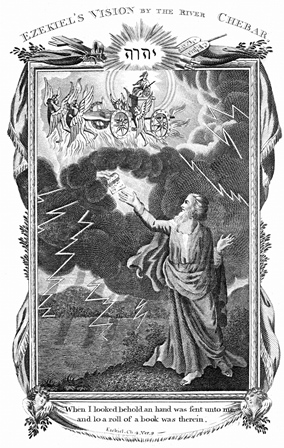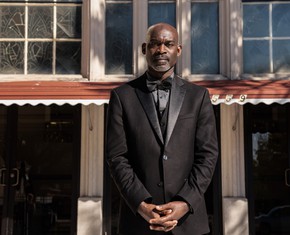The views expressed in our content reflect individual perspectives and do not represent the authoritative views of the Baha'i Faith.
 Will the Return of Christ actually be Christ Himself? Scripture indicates that:
Will the Return of Christ actually be Christ Himself? Scripture indicates that:
If anyone should say, Lo, here is Christ … believe it not. – Matthew 24:23
Knowing this, imagine if someone inside her home heard a neighbor yelling, “Here is Christ on the clouds!” Should she go outside to confirm it — or follow scriptural guidance, which says “believe it not”? It seems if Christ knew He would return on physical clouds, He would not have given this warning, because it would only confuse those who took it literally. He did, however, give the warning. Why? Perhaps Jesus wanted to tell us that He, Himself, will not return.
In fact, Christ declared that those who would overcome the trials of the end days would receive His new name:
Him that overcometh will I make a pillar in the temple of my God … and I will write upon him my new name. He that hath an ear, let him hear what the Spirit saith unto the churches. – Revelation 3:12-13
This shows that not only will Christ not come in His own name, but those who try to come in His name will deceive many.
For many shall come in my name, saying, I am Christ; and shall deceive many. – Matthew 24:5
Clearly, no one, not even Christ Himself, can come in the name of Christ. Anyone doing so would be false. Of course, Baha’u’llah does not do this. He does not claim the name Jesus Christ nor claim to be the person Jesus Christ. Instead, He claims to be the Return of Christ because He is the Return of the Spirit of Christ in a new name, just as Christ prophesied.
Interestingly enough, Baha’u’llah’s name can be found in the Bible. Just as Christ is a title, which means holy one or anointed one, the name Baha’u’llah is a title — it means the glory of God or the glory of the father. The Biblical prophet Ezekiel, one of the Jewish exiles taken to Babylon by Nebuchadnezzar, saw visions of God one day while walking near the Chebar river.
Now it came to pass . . . as I was among the captives by the River Chebar . . . I saw visions of God. . . . This was the appearance of the likeness of the glory of the LORD. – Ezekiel 1:1, 28
 Ezekiel had his vision in the very place, nearly 2,300 years later, where Baha’u’llah declared His mission to the world, while an exile from His native Persia. Ezekiel further explains this glory of the Lord as a person when he relates:
Ezekiel had his vision in the very place, nearly 2,300 years later, where Baha’u’llah declared His mission to the world, while an exile from His native Persia. Ezekiel further explains this glory of the Lord as a person when he relates:
And, behold, the glory of the God of Israel came from the way of the east: and his voice was like a noise of many waters . . . and the visions were like the vision that I saw by the river Chebar . . . And the glory of the LORD came into the house by the way of the gate whose prospect is toward the east. So the spirit took me up, and brought me into the inner court; and, behold, the glory of the LORD filled the house. Ezekiel 43:2-6
Ezekiel describes the “glory of the Lord” coming by way of “the gate”. This prophesy puzzles many people, until they realize that the forerunner to Baha’u’llah was named the Báb, a title that means “the gate”. And if the water of life symbolizes the “Word of God”, then the “noise of many waters” represents the revelation of life-giving words that flow from His mouth or “voice”.
Many other Biblical passages support Baha’u’llah’s declaration. Multiple volumes of scholarly books detail and define the prophecies that preceded this new and yet ancient Faith. But some Christians still fear this claim of Baha’u’llah’s. In tomorrow’s essay, we’ll address those fears by referring directly to the Bible’s warnings and the Baha’i teachings
Read the next article in the series: Christ’s Warning – the Anti-Christ
Read the previous article in the series: The Nature of Christ’s Return
You May Also Like
Comments

















his listeners when he was heard to say: "I have come down from heaven..."
When a number of rabbis, present in the crowd that day, heard Jesus claim that he had come down from heaven, they "began to grumble about him" and they asked "is this not Jesus, the son of Joseph, whose father and mother we know?' How can he now say, "I came down from heaven"?
The rabbis knew that Jesus had been born as a child just like everyone else. They knew that ...he had a mother and a father. So it's not surprising that they would have wondered, "How could Jesus possibly have come 'down from heaven'"?
The same was true of Jesus' own hand picked disciples. When they heard Jesus' claim that he had come "down from heaven" they too were shocked beyond belief. They knew that Jesus' claim couldn't possibly be true. They said:
"This is a hard teaching. Who can accept it?... From this time many of his disciples turned back and no longer followed him." -John 6: 41,60,66 (NIV)
Most people today know that Jesus had twelve Apostles... but, many don't know that Jesus also had either 70 or 72 disciples (depending on which early manuscript you read). Evidently it was these other disciples who "turned back and no longer followed him." It was these others who abandoned him forever.
Both the Jewish religious leaders and Jesus' own beloved disciples found it impossible to believe his statement that he had come down from heaven. From what they knew of Jesus' life, growing up in Nazareth with his mother Mary, they knew that this couldn't possibly be true... because they thought that he was speaking literally. They thought that Jesus was telling them that he had come down from heaven in his fleshly, physical body.
The disciples didn't have the insight to see what Jesus was really saying. As Jesus stood there watching his disciples walk away, knowing that they were not going to ever come back, he proceeded to explain this "mystery" of His coming down from heaven.
Jesus said: "The Spirit (PNEUMA) gives life, the flesh (SARX) counts for nothing: The words I have spoken to you are spirit (PNEUMA) and they are life." -John 6:63 (NIV)
"The words I have spoken to you are spirit..."
Jesus was trying to explain that when he said such startling things as "I came down from heaven", he was not speaking of his physical, fleshly body coming down from heaven. Instead, Jesus was trying to explain that his "words" should not be understood in their outer literal sense.
Jesus was trying to tell us that he was speaking of non-fleshly, spiritual realities. It was the "Spirit" of God which dwelled in him that had descended from heaven... not his physical body.
of "Jesus"......